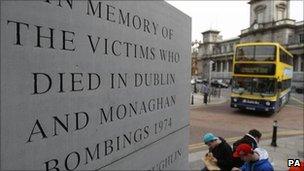Dublin and Monaghan bombing families appeal to Queen
- Published

The Queen's visit starts on the 37th anniversary of the bombings
A campaign group has written to the Queen in an attempt to gain access to secret files concerning two bombings in the Republic of Ireland in the 1970s.
Justice For The Forgotten believes the blasts in Dublin and Monaghan were carried out by loyalist paramilitaries with British state collusion.
It comes ahead of the Queen's four-day state visit to the Republic of Ireland.
Irish President Mary McAleese told RTE television the trip marked "an extraordinary moment in Irish history".
A total of 34 men, women and children, including an unborn baby, died in the explosions on 17 May 1974.
The Queen's four-day state visit - the first to the Republic of Ireland by a British monarch since independence - starts on Tuesday, 37 years after the bombings took place.
The campaign group wants the Queen to urge Prime Minister David Cameron to open up files concerning the bombings.
Parliamentary motion
In its letter, Justice For The Forgotten says the visit is a sign of improving relations between the two islands and peoples but it wants the "momentous occasion" marked by "a genuinely significant gesture of reconciliation".
It claims the files were withheld during an inquiry into the bombings, the greatest loss of life in a single day of the Troubles.
"Without this move, deeply troublesome questions remain unanswered," it wrote.
Enda Kenny said the Queen's visit was 'the start of a new era between both countries'
The group said last June's apology by the British government for Bloody Sunday - when 14 people died after paratroopers opened fire on civil rights marchers in Londonderry in 1972 - "led to an unprecedented act of reconciliation by the Protestant churches".
Campaign group spokeswoman Margaret Urwin said Mr Cameron, who will join the Queen in Dublin on Wednesday, has a moral obligation to release the files.
"The extraordinary coincidence of the British monarch arriving on the actual anniversary of the worst atrocity in the history of the Troubles gives the British government and British prime minister a wonderful opportunity to make a genuine, significant gesture of reconciliation," she said.
The appeal by campaigners comes as cross-party politicians in the Irish parliament get set to vote on a private members motion put forward by Sinn Fein on whether the government should press Mr Cameron to release all files relating to the bombings.
A 2003 report by Mr Justice Henry Barron, formerly an Irish Supreme Court judge, said there were grounds for suspecting the bombers may have had help from members of the British security forces, but there was no conclusive proof.
Peace process 'success'
A wreath-laying ceremony will take place at the Dublin memorial to the bombings in Talbot Street on Tuesday morning.
The Irish president has said the Queen's visit demonstrates the success of the Northern Ireland peace process, and will be a landmark moment in British-Irish history.
President McAleese told state broadcasters RTE: "(I think it is) an extraordinary moment in Irish history - a phenomenal sign and signal of the success of the peace process.
"I think that the visit will send the message that we are - both jurisdictions - determined to make the future a much, much better place."
- Published15 May 2011
- Published15 May 2011
- Published13 May 2011
- Published30 March 2011